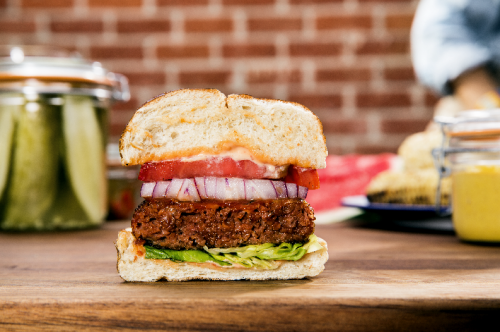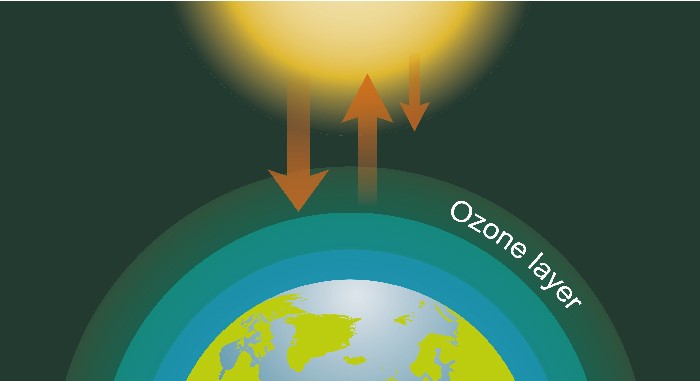Despite the growing attention on the environmental impact of our diet, a recent Gallup Poll indicates that the number of Americans who identify as vegetarians has remained fixed at about 5 percent since 2012. Globally, per capita meat and seafood consumption has been increasing steadily, driven largely by growth in the developing world. More meat means more land that must be cleared to support more livestock, driving wild species to extinction. Moral suasion and appeals to the environment will only go so far. If we’re going to eat to save the planet, consumers will need plant-based options that fit into their current diets, not the other way around.
Enter the Impossible Burger. One of a number of new alternative foods that employ scientific techniques to make meat and dairy products that are indistinguishable from the real thing, the Impossible Burger tastes, smells, and even "bleeds" just like the real deal. Made using a mix of plant-based ingredients, the Impossible Burger combines wheat and coconut oil with a magic ingredient: heme, an iron-containing compound that gives meat its meaty taste.
The heme in a conventional burger comes from proteins found in blood and muscle called hemoglobin and myoglobin. The soybean plant makes an identical ingredient, though not in the kind of concentrated levels found in animal meat. To generate the huge quantities of plant-made heme necessary for producing alternative-meat burgers, Impossible Foods’ scientists genetically engineered the yeast genome, turning it into a mini-factory for producing heme. The result is a product that tastes closer to a beef burger than any veggie burger you’ve ever tried. The company claims that for one person, swapping Impossible "meat" for a pound of ground beef would save seven pounds of greenhouse gas emissions, 90 gallons of water, and 290 square feet of land. And it’s possible because of the new science of synthetic biology.
Synthetic biology uses a similar principle but takes it one step further. Instead of transplanting a set of genes into another organism, scientists take specific sequences of DNA and put them together in particular combinations to perform particular functions. While only 20 years old, synthetic biology has already had notable successes, including altering the yeast genome to produce the antimalarial drug, artemisinin. But while synthetic biology has been used for some time in fields such as medicine, Impossible Foods, founded in 2011, is one of the first companies to use it to synthesize the taste of a certain food.
The implications are potentially game-changing. Tom Ellis, who leads research into synthetic biology at Imperial College London, says that if Impossible Foods "can show that they can do this at scale, at low cost, and with a convincing decreased carbon footprint, then their product is definitely something to be excited about."
Impossible Foods doesn’t plan to stop with burgers. Chris Davis, research fellow at the company, says Impossible Foods chose to make a beef substitute first because of the "outsize impact of cattle farming on the environment," but adds that heme is the ingredient "that drives the flavor of all meats." That means the technology used to create beef flavor "can be readily modulated to make the other meat flavors."
Impossible isn’t the only alternative food startup employing synthetic biology. In the Bay Area, Clara Foods is concentrating on egg substitutes and Finless Foods is working on simulated fish. Both firms have attracted $3.5 million in funding, though neither has a product yet. The Oakland-based nonprofit community project Real Vegan Cheese is planning a synthetic version of cheese, initially raising $37,000 through crowdfunding, and a further undisclosed sum from a private investor.
El Segundo-based Beyond Meat, which does not use genetically modified ingredients, is backed with $72 million in venture capital from big name investors, including Bill Gates, and has sold 25 million alternative Beyond Burgers since 2016.
Impossible Foods, meanwhile, has raised nearly $400 million and sold more than 13 million Impossible Burgers since it launched in 2016. (Gates is also an investor in Impossible Foods.)
Firms making synthetic alternatives face challenges of scalability, regulation, and consumer resistance. The Food and Drug Administration (FDA) has deemed heme, Impossible Burger’s key ingredient, safe to eat, but that doesn’t mean regulatory barriers will end. Missouri has banned the use of the word "meat" to apply to anything that isn’t derived from an animal, and the National Farmers Union in the U.S. is lobbying for the word "meat" to be removed from the labelling of synthetic meat products like those sold by Impossible Foods. The European Union (EU) is taking a precautionary approach, and has imposed stringent regulations on the development of gene-edited crops even though Impossible Foods does not yet sell its products in Europe.
Consumers have long been wary of genetically modified (GM) foods, and those fears have been stoked in the U.S. by the environmental group Friends of the Earth, which argues that Impossible Foods’ synthesized heme may have unforeseen health risks? something the company strenuously denies.
Raymond Anthony, a professor of philosophy at the University of Alaska Anchorage and a specialist in agricultural ethics, believes it might be difficult to escape the "historic anxiety" about genetically modified foods. "The sentiments and images conjured by ‘factory farming’ and ‘Frankenfoods’ memes are powerful and long lasting, and have put industrial agriculture and the GM sector on the defensive, forcing them to overcome public distrust."
If regulatory barriers and consumer anxieties are overcome, however, what could happen if the world embraced synthetic meat production?
The most hopeful possibility is that it could transform land use, as less territory is needed to raise livestock. Ben Phalan, a conservation biologist and visiting professor at Federal University of Bahia in Brazil, notes that about two-thirds of global agricultural land is pasture, and that about a third of global cropland is used to produce livestock feed, such as soybeans and maize, instead of food for people to eat directly. "That’s a problem for biodiversity, because raising crops and livestock typically replaces natural habitats," he says. "Forests are cleared, wetlands are drained, and grasslands are fertilized and planted with just one or two species of grasses."
The rest of us would have to confront some of our own prejudices. Stellan Welin, emeritus professor of biotechnology, culture and technology at Sweden’s University of Linköping, points out that while most of us disapprove of chopping down the Amazon rainforest for beef farming, we are less enthusiastic about woodland in our own countries: "When you have grassland anywhere and there’s a proposal to replace it with forest, people become very upset."
The rewilding that could result from a shift away from meat throws up other cultural challenges. The reintroduction of even small numbers of wolves to some Northern European countries has been met with marked hostility, as has the release of beavers and wild boar in the U.K.
Anthony, however, argues that there has been a growing interest in food production as people push back against some of the unwieldy aspects of the global industrial food system. "Many of us long to be active participants in the production of what we eat and how we eat it, and resist being just passive recipients," he says.
The paradox is that if we want to end livestock farming as a way of getting closer to nature, then the method we’re choosing, synthetic biology, is taking us further away from it. In nature and in technology, there’s no such thing as a free lunch.

What we eat matters to the planet. Meat and dairy production are major contributors to climate change. A 2013 study by the UN’s Food and Agriculture Organization estimated that livestock were responsible for more than 14 percent of all man-made greenhouse gas emissions, and more recent research has found even higher numbers. Changing your diet can make a difference - a study published last year by the University of Oxford found that plant-based diets could reduce food’s greenhouse gas emissions by up to 73 percent.




